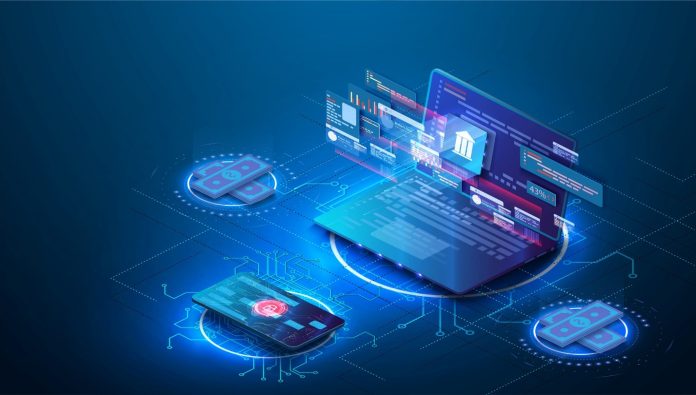The push for economic diversification by the federal government led by President Muhammadu Buhari has been boosted by the milestone in the digital economy sector, especially in Information and Communication Technologies (ICT).
Following this development, President Muhammadu Buhari praised the federal government’s effort for the $547 million generated from the sale of 3.5GHz spectrum to MTN Nigeria and Mafab Communications for the provision of 5G network in Nigeria, describing it as a important revenue base. For development.
The president made this known in his speech at the launch of the National Shared Services Center (NSSC) in Abuja on Tuesday, adding that the huge sum of money made from spectrum sales was an indication that the digital economy is driving growth, employment and wealth creation in the country.
The massive building managed by Galaxy Backbone Limited is located within the central business district of the nation’s capital and houses a cyber security operations center, network center and call center. It is a true digital connectivity platform for Ministries, Departments and Agencies (MDA) to interact with citizens.
The current administration’s economic diversification agenda has been boosted by the information and ICT sector and has improved the country’s GDP, which according to the National Bureau of Statistics (NBS) contributed a record 18.44% to GDP , at the end of the second quarter of 2022 to three times the contribution of 6.33 percent of the oil sector in the same quarter.
“As part of our efforts to expand our digital infrastructure, we increased our 4G base stations from 13,823 to 36,751 from August 2019 to date, and this has increased the percentage of 4G coverage across the country from 23 percent to 77.52 percent. , also from August 2019 to date. We have also followed this with the rollout of 5G services.
“It is noteworthy that the digital economy sector has excelled in generating revenue for the government. In particular, at the Ministerial Retreat that I chaired on October 18-19, 2022, our independent analysts determined that the digital economy sector had generated 594% of its revenue target since the 2019 baseline. This is very laudable.
“As part of these unprecedented achievements, the industry generated more than $547 million from the 5G spectrum auction alone,” Buhari said.
NCC grants Mafab a 5-month extension to deploy the 5G network
The president also said that his administration has created the enabling environment “To ensure that the digital economy sector continues to be successful and to reduce the burden on citizens, I recently approved the suspension of the proposed excise tax on the telecommunications sector, as any initiative that will lead to difficulties for citizens would not be prosecuted”.
He added that “our administration’s commitment to promoting privacy and promoting data is receiving praise around the world, and we have increased our digital identity enrollments from 39 million in October 2020 to around 92 million today.
“The massive increase of around 63 million in about two years is a global success story and has led to several partnership requests from countries within and outside of Africa. I also approved the establishment of the Nigerian Data Protection Office on February 4, 2022, to provide an institutional framework for data protection in Nigeria, in line with global best practices,” the president told the expert meeting. in ICT and government officials. ”
In his words, the minister of communications and digital economy, Prof. Isah Ibrahim Pantami, praised the president for his support for the digital economy, with broadband sales/Internet penetration, acquisition of skills for global competitiveness and infrastructure development. such as fiber optic cable. , which was about 15,000 km in 2015 and increased to more than 60,000 km.
In addition, speaking to the managing director of Galaxy Backbone, Professor Muhammed Bello Abubakar, said that the need for digital inclusion led the agency to connect more than 400 MDAs to the National Center for Shared Services.
Abubakar further said that the administration has achieved a significant milestone in the drive to position the country in the rapidly changing world of the Fourth Industrial Revolution.
“In the rapidly changing world of today’s fourth industrial revolution, driven by ubiquitous connectivity in the cyber world and advanced digital technologies such as cloud computing, Internet of Things (IoT), artificial intelligence, augmented reality, robotics, etc., it is no coincidence that most corporation capitalized by Apple, Google, Amazon, Microsoft, etc., are the main enablers of the global digital economy. Obviously, if the new digital age is not embraced, the nation will be trapped in the “sands of time”.
“Realizing this fact, the federal government created Galaxy Backbone Limited in 2006 to drive digital inclusion in the public sector, underserved areas and other stakeholder communities, to complement the more significant progress in ICT that is taking place. in the private sector. industry economy.
“In accordance with its mandate, Galaxy has built a multi-platform ICT infrastructure connecting more than 400 ministries, departments and agencies on a ‘one government’ network platform known as 1-Gov.net and currently implements broadband connectivity. terrestrial (fiber) for 30 states of the federation”, he said.
Galaxy Backbone has also made significant strides in building trust with its customers, including becoming the first public sector establishment to earn prestigious international certifications including ISO 27001 in information security management; the ISO 20000 Certification in IT Service Management as well as the Payment Card Industry Data Security Standards (PCI-DSS).
With the massive data hosting, colocation and cloud computing capabilities that the building commissioned brings on board, Nigeria is certainly positioning itself well to take its place of honor in the emerging digital world.







